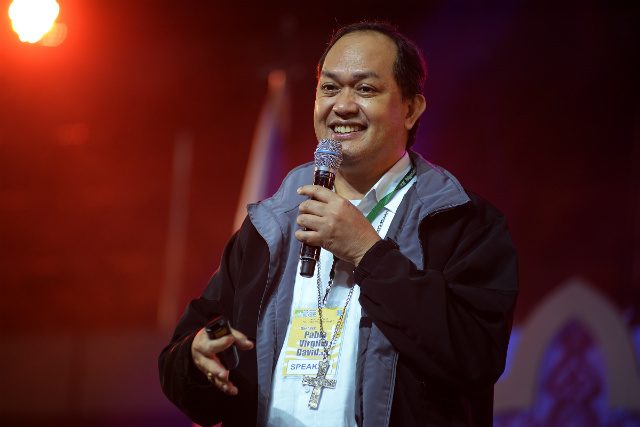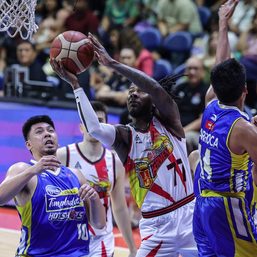SUMMARY
This is AI generated summarization, which may have errors. For context, always refer to the full article.

MANILA, Philippines – Caloocan Bishop Pablo Virgilio David made headlines on Sunday, September 10, after he took custody of the family of witnesses in the killing of 17-year-old Kian Loyd delos Santos at the hands of police.
The death of Delos Santos, which happened in a Caloocan City drug raid, showed the alleged abuses in President Rodrigo Duterte’s anti-drug campaign.
Weeks earlier, on August 23, David addressed officers of the Philippine National Police (PNP) about the Philippine government’s war on drugs.
Below is the full text of David’s speech before the PNP, which Rappler is republishing with his permission.
When I think of human rights, I do not think of the CHR (Commission on Human Rights); I think rather of the PNP (Philippine National Police).
Since the police are there mainly to enforce the law, which is founded on the fundamental human rights of citizens, I think it is but right to think of you as the main protectors of our human rights as ordinary citizens. You are most particularly needed by the poor and the vulnerable sectors of our society – those who don’t live in gated and guarded subdivisions.
Actually, the CHR is just a little self-monitoring government agency, which was established precisely to guard the civil liberties we had lost under the Marcos dictatorship. It was instituted only to make sure that the PNP (and all other men and women in uniform) remain consistent with their mandate: to serve as primary advocates and protectors of our human rights, never their abusers.
It is there precisely to help the police maintain the integrity of their institution. It is there to remind you that you are obliged to follow only the orders that are just and lawful, never those that contradict the public welfare and the common good which you are duty-bound to protect with your very lives.
I am not a simplistic person. I will never blame the mistake of a few police officers on the whole institution. Yes, there are crooks among the police, just as there can be crooks in any other human institution, including the Church. And I say that with all humility.
But wherever an institution exercises power, there is always a strong tendency for its members to be tempted to abuse its power, if there is no built-in mechanism for checks and balances.
More importantly, the tendency towards abuse can be put on check only by proper education and formation, discipline, and constant reorientation in the moral and spiritual values that your institution holds dearly.
The real battles in this world, according to your patron saint, Saint Ignatius of Loyola, are spiritual; they are the battles between good and evil, between the standard of Satan and the standard of Christ.
Illegal drug trade a crime
Let me open my heart to you on where I stand on the issue of our country’s problem with illegal drugs.
The trading and selling of illegal drugs is, no doubt, a crime and a peace and order issue; we have no question about that. It thrives on the proneness of people to a disease called addiction, which is primarily a mental and psychological health issue.
The poor who have to survive a hostile and stressful physical and social environment daily, are particularly vulnerable to this disease. I therefore feel that it is unrealistic to address addiction as a peace and order issue without addressing it at its root, both as a health and a poverty issue.
Addicts become pushers because they eventually find themselves peddling illegal drugs in order to sustain their addiction. What makes it hard to address it as a health issue is that mere use or possession of illegal drugs constitutes a criminal offense in the Philippine laws. It is the reason why our jails are presently congested way beyond their maximum capacities. And 80-90% of the inmates are people with substance use disorder. What they need are not prisons but rehab centers. We have to start with the premise that they are human beings who have fallen ill and who can be rehabilitated.
Kaya po tayo naririto ngayon para makapag-usap tayo tungkol sa mga “initiatives” para sa rehabilitasyon ng mga taong may “substance use disorder”. Alam po natin na kakaunti lang ang mga available na “in-house drug rehab facilities” sa ating bansa. Pero ayon sa mga pag-aaral, only around 9% of people with substance use disorder actually need expensive in-house facilities.
There are enough templates to benchmark from if we are to explore the effectiveness of alternative drug rehabilitation programs that attend, not just to the patients’ care, but to the families’ care and the community’s care as well. We in the Diocese of Kalookan have entered into a fruitful partnership with the Caloocan LGU’s CADAC (city anti-drug abuse council) for this endeavor, and have already graduated several batches of patients who have been delisted from the dreaded “drug watch list.”
Integrity of PNP
Our point is that if only we could work together, you, our law enforcers can be spared from having to deal with petty crimes reinforced by drug use on the community level. You can then focus your law enforcement work on pursuing the true criminals who are the drug lords and suppliers who flood our country with illegal drugs.
Sa pamamagitan din ng programang ito ay magiging mas magaan ang inyong trabaho at makapagliligtas pa tayo ng mga buhay ng mga taong dapat ituring bilang mga biktima ng droga, imbis na kalaban. Alam kong hindi rin madali para sa inyo ang malagay sa mga sitwasyon ng labanan na hindi lubos na nakikilala kung sino talaga ang kalaban. Kapag nagpatuloy pa ang nangyayaring mga patayang kaugnay sa giyera kontra droga, baka tuluyang gumuho ang integridad at kredibilidad ng buong institusyon ng kapulisan.
Your 3 slogans in your coat of arms are beautiful: service, honor and justice. They are values that stand for your institution, and which give it the integrity and respect that it deserves. We need you, our dear policemen, to be true to these values because we need a police institution with integrity.
I do hope you don’t take it personally against us in the Church when we protest against some perceived abuses among your ranks and protect witnesses who are willing to testify against those among you who compromise the integrity of your whole institution.
It is our duty as Church leaders, as shepherds – to protect the flock entrusted to our care, especially the weak and defenseless among them.
And I would like to believe that you are our allies, not our enemies, in this endeavor.
Thank you, and may God bless you all. – Rappler.com
Add a comment
How does this make you feel?





There are no comments yet. Add your comment to start the conversation.